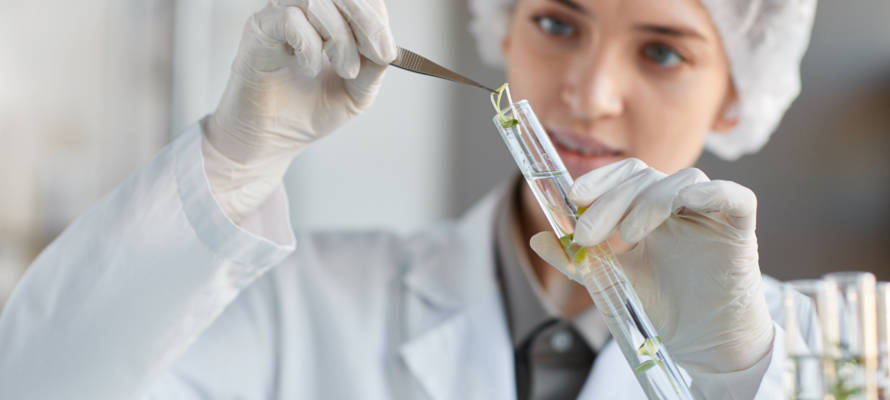For the first time in history, Israeli researchers developed a “biological antibiotic” that could act as a substitute for traditional chemical antibiotics.
Tel Aviv University researchers have developed a biological substitute for the treatment of tuberculosis, which in the future could serve as an alternative for the traditional “chemical” antibiotic therapy.
In the course of the new and groundbreaking study, led by Dr. Natalia Freund and the doctoral candidate Avia Waston at the Sackler Medical Faculty, the research group succeeded in isolating monoclonal antibodies, derived from single cells, which hindered the growth of tuberculosis germs in laboratory mice.
The antibodies were isolated from a patient who had contracted tuberculosis but had since recovered. This is, in fact, the first time in history that researchers have managed to develop a “biological antibiotic” and demonstrate that human monoclonal antibodies can act as a substitute for the traditional chemical antibiotics and protect mice from the pathogenic bacterial challenge.
The study was carried out in a collaboration with two additional laboratories from the U.S. and China.
For the last century, antibiotics have served as the main treatment against germs, being both efficient and cheap.
Antibiotics are chemical agents, which are designed to block and destroy specific cells, such as microbial cells. However, since some biological mechanisms are common to both human and microbial cells, the range of antibiotics that can safely be used without harming the patient is limited.
For example, cell wall components of many strains of microbes are common to human cells. Therefore, any damage caused to the microbial cell walls can lead to extensive damage to body systems.
Furthermore, in recent years, the number of microbial strains that are antibiotic resistant has increased, presenting new challenges of how to defend the body from microbes in the post-antibiotic era.
For these reasons, Dr. Natalia Freund and her laboratory team have spent recent years searching for a biological substitute for known antibiotics.
Antibodies are proteins that are produced naturally by our immune response following infection or a vaccine. They harbor many advantages such as specificity, stability and safety. For these reasons, antibodies are in widespread use in the clinic for treatment of cancer, autoimmune diseases and viral infections such as COVID-19.
The research team chose tuberculosis, which is caused by infection of the bacilli mycobacterium tuberculosis, as a test model, and were successful, for the first time ever, in devising an effective treatment on the basis of anti-bacterial antibodies naturally developed during infection.
Another reason for the choice of tuberculosis is, that although the vaccine against tuberculosis was developed 100 years ago, and is based on the attenuated bacillus bovis (BCG) strain, it is not effective in adults and does not prevent infection.
In addition, in recent years, more varieties of disease have developed that are resistant to the only treatment that is currently available, namely, treatment with antibiotics. Since tuberculosis germs are very infectious, transferred in the air and detrimental to the lungs, the spread of resistant strains of tuberculosis that modern medicine cannot combat is a real danger.
Currently, the rates of drug-resistant strains of tuberculosis are peaking as high as 40% in some countries. In Israel, there are about 200 active tuberculosis cases per year.
Dr. Natalia Freund explained that “new ways to kill bacteria are urgently needed. Advances in biological medicine have enabled us to rout the germs in new ways that are not based solely on antibiotics, and therefore allow a solution to the challenge posed by resistant germs.”
“Our study is an initial proof of concept of employing monoclonal antibodies as an effective therapy in combating bacterial pathogens,” said Dr. Freund.
It should be noted that owing to the size and complexity of the tuberculosis bacillus, isolation of monoclonal antibodies to it has been extremely challenging. The researchers in Freund’s laboratory have succeeded in pinpointing a phosphate pump protein on the bacillus cell wall, which supplies energy to the bacterium and is highly specific and conserved to all tuberculosis strains.
The two types of antibodies the researchers have isolated, which block the action of the pump, inhibit the bacteria growth and reduced the bacterial levels by 50% in mice as compared with mice that were not treated with antibodies.
Furthermore, these antibodies have been found to be active against three different strains of the tuberculosis bacillus; and seeing that the antibodies are directed against the phosphorus pump, which is common to all strains of this bacillus, it is expected that the vaccine will be effective against many other strains that were not investigated, including those that are resistant to antibiotics.
In view of the success of the study, Dr. Freund’s laboratory is investigating the possibility of extending the “biological” substitute for antibiotics to include other diseases.
“The model that has proven successful in this study will enable us to extend our future work to include other diseases such as pneumonia and staphylococcus infections,” Freund concluded.
(United with Israel).
